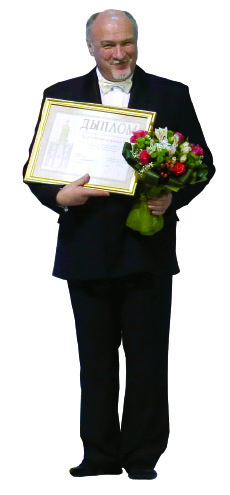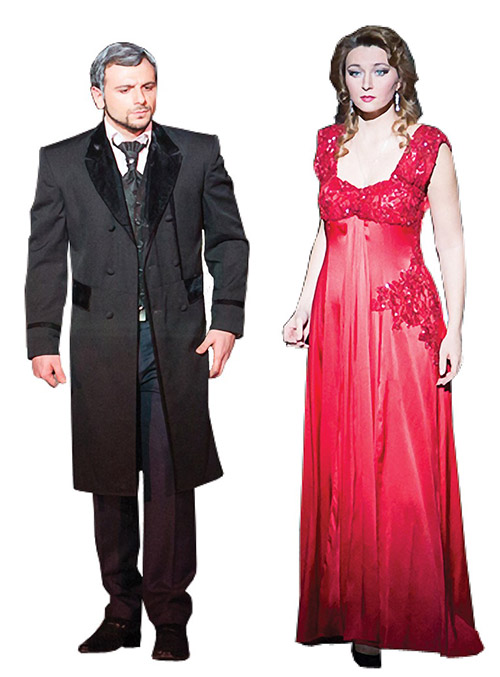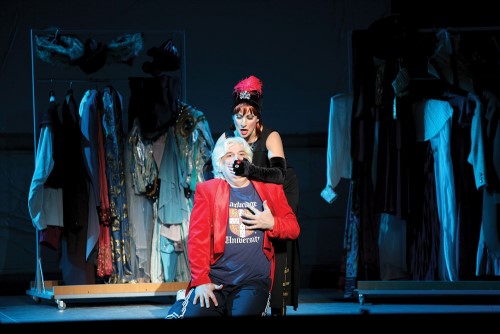 National Academic Bolshoi Opera and Ballet Theatre of Belarus marks end of 2014 with Christmas Opera Festival and the 5th Minsk International Christmas Opera Forum, gathering 155 performers, from various countries worldwide, competing in Minsk International Christmas Contest of Vocalists
National Academic Bolshoi Opera and Ballet Theatre of Belarus marks end of 2014 with Christmas Opera Festival and the 5th Minsk International Christmas Opera Forum, gathering 155 performers, from various countries worldwide, competing in Minsk International Christmas Contest of Vocalists
The brightest opera festival, so beloved and honoured by Minsk residents, was held once again in December days, on the eve of Christmas. The Bolshoi Theatre of Belarus presented a premiere of the opera Pagliacci, by Ruggero Leoncavallo, in a brilliant setting. Directed by Mikhail Pandzhavidze, it starred People’s Artist of Georgia Teimuraz Gugushvili as Canio. Mikhail is a Knight of the Order of Honour of the Georgian Republic, a soloist with Tbilisi’s Academic Opera and Ballet Theatre, and a laureate of many competitions. His fans call him ‘a golden tenor’ of world opera.
Meanwhile, Queen of Spades, by Pyotr Tchaikovsky, starred famous People’s Artist of the USSR Irina Bogacheva, as the Countess. Irina is an outstanding prima of the Russian Opera, from St. Petersburg. In Giuseppe Verdi’s Rigoletto, Honoured Artist of Ukraine Vladislav Goray played the Duke of Mantua. Meanwhile, the Chamber Hall (named after Larisa Alexandrovskaya) saw two premieres directed by Mikhail Pandzhavidze’s works: La Serva Padrona, by Giovanni Pergolesi, and Maestro di Capella, by Domenico Cimarosa.
After the final concert, Young Voices of the World Opera, winners were announced. The Director General of the Theatre, Vladimir Gridyushko, noted that the event had strengthened the spirit of creativity and brought the shared joy of world masterpieces and spiritual unity. The final concert ended with Prayer, by Mardzagaliy, performed by everyone present, bringing a sublime and beautiful feeling of unity, which defied description; it brought great applause and shouts of ‘bravo’. The audience was overcome with delight and gratitude to the organizers of the festival: feelings to be long remembered.
Mr. Gridyushko is utterly dedicated to his vocation and recently won a prize ‘For Spiritual Revival’ for his Vitovt performance, with its national-historical theme, as awarded by President Alexander Lukashenko.
Vladimir, what is your impression of the ‘Christmas Forum’ and the ‘Contest of Young Performers’? Was there anything you would have changed?
There was nothing I didn’t like but there is no limit to perfection; taking into account our experience, we’ll keep improving.
As the chairman of the jury for the Contest of Young Vocalists and the Christmas Forum did you not become weary?
Work has been incredibly stressful, as judging lasted all day and the evenings were given over to performance. However, everything went well, and we managed to finish by 6pm. In France, we began judging at 10am and ended at 10pm. The first round took a day and a half, with the number of participants almost the same as seen at the recent event: imagine the stress! Everything is relative.

The Christmas Opera Forum was opened with a premiere of the opera Pagliacci, by Ruggero Leoncavallo,
directed by Mikhail Pandzhavidze. People`s Artist of Georgia Teimuraz Gugushvili starred as Canio
When did you begin to prepare and how many people have been involved?
We began a year ago. A lot of theatre services participated. Shortly beforehand, we involved volunteer students from the University of Culture. I’m grateful to them and also wish to express thanks to our partner, ‘Belarusbank’.
Has it been difficult to promote The First Contest of Vocalists?
It has been hard, as it’s a huge responsibility. Members of the jury came from various nations since this helps encourage diverse participation. I recall one international contest that had just 32 people in the first round, which was then reduced to 16. We used all possible means, including advertising on various online sites, and sending emails to contacts, using our memorandums of co-operation with 25 European theatres. Initially, we received applications from 280 people but not all could attend: we ended up with 155 people, which is a lot. The optimal number of participants is 100-120.
The first round lasted three days, with vocalists singing one aria. The second round required two arias, and the third obliged the performance of main parts. Performers sang ‘scenes’ with our artists, accompanied by a symphony orchestra. The Minsk contest differs from others in this way.
As the chairman of the jury, did you need to persuade your colleagues regarding the winner, or was the jury unanimous?
I didn’t have to persuade my colleagues and there were no discussions. Every judge had a planchette, one side of which was red, prohibiting a singer from reaching the next round. The other side was green. Judges sat in a row, unable to see each other. Only 30 people could go to the second round.When surname of each participant was called, the judges raised their planchette, allowing two people to count: one for ‘red’, and the other for ‘green’.

Winners of the first Minsk International Christmas Contest of Vocalists: Lasha Sesitashvili (Georgia) — the third award, Valentina Fedeneva (Ukraine) — the second award
Everything was simple and there were only one or two cases where opinion was divided. As chairman of the jury, I used my ‘double vote’ six times. It would be a shame if talented singers didn’t pass to the next round so, in the semi-final, we increased the number of places to six.
Is Belarusian Opera and its singers seeing an upsurge in popularity?
We have invited and continue to invite artists from outside Belarus: Belarusians from Prague and from Bratislava come to us. Irina Gordey has sung in some of our performances and will play ‘Tosca’ soon. Her Gala Concert was held at our theatre. Ivan Shupenich has also sung. Yes, there have been a lot of Belarusians. We are open to all who want to perform at our theatre.
Did your affair with opera begin during your leadership of the Bolshoi Theatre? Or did your love awaken earlier, perhaps in childhood?
Yes, I’ve always loved opera. I attended a music school, where I met my wife. We learned to play the accordion in Svetlogorsk and our son and daughter have also attended music schools. My parents belonged to the rural intelligentsia: my father was a headmaster, and my mother was a teacher. Certainly, they understood that music develops the personality, so they had good reasons for sending me to a music school.
After the third year, I intended to stop having music lessons, but my now-deceased father told me to only give up if I wasn’t ‘able’. That was a ‘challenge’ which inspired me to continue and I graduated from music school, entering Gorky’s Teacher Training College. My wife studied music longer, graduating from the College of Music, then the Conservatory.
My connection with music exists not only through my wife; it seemed to be destined, as I realized recently, thinking about the coincidences in our life. The building of our theatre was opened on March 10th, 1939, and my birthday is on March 10th. I never considered that I’d become Director General of the Bolshoi Theatre.
Did you crave leadership in childhood?
Certainly, I did. At school, I chaired a group and then the Pioneer Brigade Board, before becoming Secretary of my school Komsomol Committee and Secretary of the Komsomol Town Committee in Svetlogorsk. I finally took the position of Secretary of the Komsomol Committee of Belarus.

Ramiz Usmanov (Uzbekistan) — grand prize of the contest, next to him —Honoured Artist of Belarus Anastasia Moskvina; Maria Shabunya (Belarus) — the first award
Can you explain Belarus’ recent love affair with opera? It’s an elite art and not simple to understand.
Belarusian audiences have achieved a certain level of appreciation. In addition, we’ve created a very good basis from which to attract them, with famous names and titles. This helps us to gather a full house. Over the last 5 years, we’ve staged 45 successful premieres.
You tour abroad a great deal. What do you most remember, besides stage performances?
My journeys are, as a rule, connected with signing agreements and memorandums. I also try to see foreign performances, to improve my understanding and to see whether we are moving in the right direction. I didn’t meet the greatest stars abroad. Rather, I met Maria Gulegina in Belarus, and Nina Ananiashvili. Our friendship has brought about some interesting projects, including ‘Ballet Summer at the Bolshoi’ and a performance of a Georgian ballet and the ballet ‘Laurencia’. Nina is the most wonderful woman: not only talented but easy to talk to and charming.
I’m glad that I’m a friend of Andris Liepa: one of the top opera stars, whose performances have enriched our repertoire. I’ve met the Head of the Vienna Opera Dominik Meyer and we may co-operate in future. Our interests differ, as do our spheres, principles and methods, but we have something in common.
I had the idea for the ‘International Christmas Contest of Vocalists’ while on the International Jury at the Contest of Vocalists in France, in the little town of Bordeaux. I’ve been there twice; after my first visit, I realized that we need such contests. It’s important and prestigious for our country, as well as for our people — especially our vocalists. Such contests tend to gather young performers, under the age of 30; however, ours drew successful opera singers under the age of 35-38. It’s unique. We have a lot of theatre directors on our jury: Hans-Joachim Frey from Austria; Canada’s Alen Nona; Tadey Yeder from Lviv; and Mart Mikk from Estonia. Many of them I’ve known a long time.
How did you become friends with Tadey Yeder? He spoke so warmly of you at the press-conference before the Christmas Forum.
Tadey and I have known each other for many years. The first time he came to Minsk was for an evening honouring Zinoviy Babiy, when I’d just become the head of the theatre. I remember Tadey going on stage and praising outstanding tenor legend Babiy. Later, we signed a memorandum of co-operation.

The scene from the Pagliacci performance — soloist of the Bolshoi Theatre of Russia Segey Maskalkov
and Honoured Artist of the Republic of Belarus Nina Sharubina (Tonia and Nada)
I invited Tadey to the ‘First Christmas Forum’, then to the second and to the third. Now, he comes every year. I visited him in Lviv one year, during a holiday, and we became friends. I’m also friendly with BakhtiarYakubov, from Tashkent, with whom I’ve organised exchange trips: our soloists have gone there, and theirs to us. The history of friendship with Azerbaijanian theatre began with the ‘Days of Culture of Belarus in Azerbaijan’, where I worked with the Ministry of Culture and headed the Belarusian delegation.
As my life is now dedicated to the Opera and Ballet Theatre, I’ve asked for a trip to Azerbaijan’s Opera and Ballet Theatre. I know Akif Turanovich Melikov, the Head of the Theatre, with whom I’m friendly. Our opera and ballet soloists have begun making exchange trips and those from Azerbaijan come to us. They brought the ballet ‘Seven Beauties’ to our stage and we then added our own choreography and sets, to make our own version. In December 2014 we took the show to Baku, being received very enthusiastically. World famous composer Arif Mirzoev told me that our performance was just as Gara Garayev, the composer, from Azerbaijan, would have intended.” I was very pleased.
If you had the opportunity to sing, with whom of your soloists would you choose?
So many! I once met famous tenor Peter Dvorsky, who was heading Bratislava’s Opera House. He had just retired, aged 50: quite a young age for opera singers. Operatic voices can suddenly disappear. I listened to his records and he had a voice of incredible beauty, singing with many world stars. Maria Gulegina tells me that Dvorsky is her favorite Alfred in ‘Traviata’.
With whom of our artists would I like to sing? So many: Nastya Moskvina, Oksana Volkova, Stas Trifonov, Volodya Petrov, Volodya Gromov, Nina Sharubina, Ilya Selchukov — our ‘brilliant’ baritone, and Edik Martynyuk! There are few such chic tenors with such artistry! He can do somersaults and sing at the same time! Meanwhile, Yura Gorodetsky has such a warm, rare timbre.
The troupe of the Bolshoi Theatre is very strong; many must envy us. I can talk of our ballet artists for ages. Sasha Chizhik is experiencing a wonderful time: she’s a beautiful ballerina, dancing so many leading roles. Lyuda Khitrova is another wonder.
You say that audiences like famous names. Is this why you invite soloists from other theatres?
Yes, and for the creative interchange, which helps our own performers and those from abroad, to improve. Everything is relative. When a Belarusian audience sees that our performers have strong, bright voices, they can be proud of them.
Do opera stars have any demands when you invite them to sing?
They don’t demand anything unusual, although Belarusian hospitality is well-known; we always meet guests at the airport, arrange accommodation in excellent hotels and pay for meals. During the Christmas Forum, some people were placed in the Minsk Hotel, and some in the Victoria Hotel. The judges resided in the Belarus Hotel.
Our partners helped us with transport. When Maria Gulegina came, she lived in the Svisloch Hotel (now called the Grand Plaza). Foreign artists never complain about the stage or dressing rooms. When they leave Minsk, they only express gratitude. Hvorostovsky has visited us more than once, attending the ‘Slavianski Bazaar’. Is it right to promote famous names? Our hall is not large and we need funds to carry out new projects.
Where did you place those who came for the contest of vocalists?
They paid for their own meals, transport and accommodation — as is world practice. They also paid an entrance fee. Those in the semi-final received meals. Happily, none were offended and, before leaving, thanked us. We provided all with entrance tickets to performances of the ‘Christmas Forum’. Members of the jury with us for the first time also expressed gratitude, saying that they hadn’t met anything like this in other countries.
Which projects do you like most?
Projects are like children: we love all. We had the ‘Big Ball at the Bolshoi Theatre’, ‘Evenings with the Bolshoi at the Radzivill’s Residence’, ‘Russian Seasons’, the ‘International Christmas Opera Forum’ and the recent ‘Contest of Vocalists’, which I don’t doubt will become a tradition. We also organized the ‘Ballet Summer’ at the Bolshoi, and how can you not love our ‘Parterre’ magazine or our ‘Big Encyclopedia of the Bolshoi Theatre of Belarus’? It’s a masterpiece!
Tell us about your PR?
Every project should be promoted, as should every name — with the help of advertising, television and other media. Some of our projects don’t need it: the ‘New Year Ball’ was sold out in September. We promoted the ‘Christmas Forum’ and the ‘Evenings at the Radzivill’s Residence’, using every avenue to promote them just beforehand.
Which premieres are due in 2015? How do you plan to impress audiences?
We’ve created sensations many times. It’s important to produce quality products. As to premieres, you can expect the operas ‘Tsar’s Bride’ and ‘Carmen’, as well as Eifman’s ballet ‘Anna Karenina’.
How many people are subordinate to you? Do you like heading the Bolshoi Theatre? How did you feel going on stage after the Gala Concert? You simply said: ‘That’s all!’
More than a thousand people work at the theatre. There are 150 in the symphony orchestra alone and 120 with the ballet, as well as 70 opera soloists and 70 in the chorus. Then, there are all those in the production and catering teams, and administration. I love serving the Theatre, although I’ve enjoyed all my jobs. I confess that I like going on stage, knowing that I’ve discharged my duty. I then feel huge joy, as all is complete.
By Valentina and Ivan Zhdanovichi











